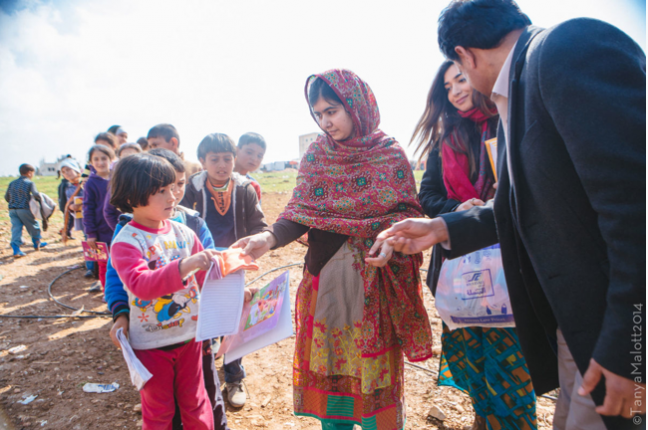Almost a month after Malala Yousafzai became the youngest recipient of the Nobel Peace Prize, the CEO and co-founder of her non-profit was the keynote speaker at a Go Big Read event on campus Monday.
Shiza Shahid, the 25-year-old CEO and co-founder of the Malala Fund, talked about this year’s Go Big Read selection I Am Malala in a lecture in Union South. The book chronicles Yousafzai’s fight for education equality for women in Pakistan and her rise to global recognition as a symbol of peaceful protest.
Shahid attended Stanford University after leaving Pakistan. She met Yousafzai as a sophomore while advocating for women’s right to attend school, UW Chancellor Rebecca Blank said.
“I come from humble origins and being here today doing the work that I do makes me believe that every person that has the opportunity to pursue their dreams must do so,” Shahid said.
Shahid said Yousafzai came from Pakistan, which has the second highest number of children out of school and is a place where terrorism and suicide attacks were becoming commonplace.
Shahid was active in volunteering. At 14, she volunteered in women’s prisons. At 16, she volunteered at an earthquake relief camp.
“Malala said, ‘I wanted to understand what was happening to help my country and my society,’” Shahid said.
Shahid said she first encountered Yousafzai through a documentary that Yousafzai and her father published.
“Three hours north of my own city Yousafzai spoke out through a documentary and said the Taliban was taking her right away from going to school,” Shahid said. “I felt accountable. I could’ve been her. I asked myself what I could do.”
Shahid then started a secret summer camp for Yousafzai and 25 other girls like her. She prepared curriculum and recruited friends to act as volunteers to talk to these girls and hear about their plight.
After that summer she took a high-paying job involving travel through the Middle East. One year into her job in Dubai she received a text saying Yousafzai had been shot, Shahid said.
The Taliban had stopped a school bus Yousafzai was on and asked which of them was ‘Malala.’ Once she identified herself, she was shot in the head.
Shahid said Yousafzai survived and when she visited her in the hospital she asked what she could do to help. Yousafzai replied, “But I’m fine, tell them to help the other girls.”
Shahid then started the Malala Fund, which works with grassroots entrepreneurs that recognize the barriers of a community to an educational system and suggest ways to fix it.
“Advocacy was a huge part of the work we did,” Shahid said. “We urged people to commit resources to education. We also spent a lot of time making sure it was global, working with celebrities engage everyday people into the issue.”
In response to a student inquiry about how she keeps her passion alive at such a big global scale, Shiza said she was sure to never lose the human element and to stay close with the real stories and the real people.
Changing one life is enough, she said.


